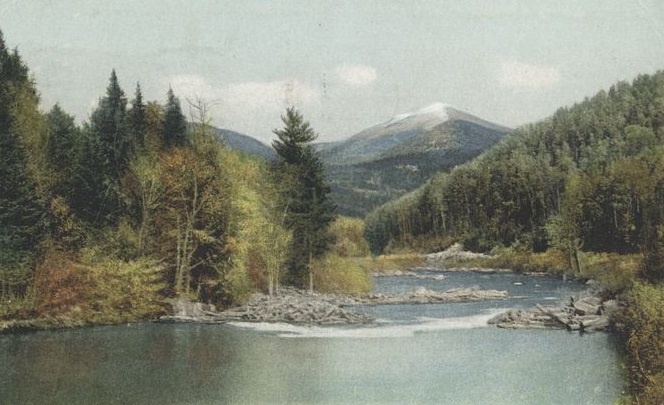Modern Essex County formed in 1799 after separating from Clinton County. It is named for the city of Essex in Great Britain. The county is located in northeast New York, the eastern border formed by Lake Champlain and the New York/Vermont border. It is the second largest and most mountainous county in New York, largely because it contains the majority of the Adirondack mountain range. It has a long and colorful history, and was the site of abolitionist John Brown's home, the emergency inauguration of Theodore Roosevelt, and the 1980 Lake Placid Winter Olympic Games.
Though it has a small population, Essex County has an extensive relationship to the American Revolution. It was long disputed territory between Great Britain and France, due to its location on Lake Champlain. The French built Fort Ticonderoga on the south narrows of Lake Champlain in 1754 in order to have a stronghold against British troops and Native Americans during the Seven Years (French and Indian) War. During the American Revolution, it became American territory, and the cannons removed from the fort were used in Boston to push back British ships. Fort Ticonderoga was abandoned after the Battle of Saratoga, and is now a Revolutionary War memorial and historical museum. It is now one of the best known American military forts.
When Essex County was officially established in 1799, it contained four towns, Elizabethtown, Crown Point, Willsboro, and Jay. Elizabethtown was chosen as the seat of the county, and remains the seat, holding the county offices and court. The main industry of the county at the time was agriculture, due to the rich soil in the Adirondacks and the numerous lakes and rivers. However, around 1800, iron ore was discovered in the mountain range, and the iron industry consumed the county. A consequential logging industry was also born in the county after the destruction of mountainous area for mining, and logging and woodwork became the two largest industries in the county.
During the time of the American Civil War, Essex County became part of the Underground Railroad, helping runaway slaves from the South find freedom in the northern states and Canada. North Elba, Essex County, was also home to abolitionist John Brown, who was hanged for leading a raid on Harper's Ferry, Virginia. His home and farm are now part of the John Brown history tour in North Elba, a major tourist attraction.
When searching for records in Essex County, a great countywide resource to visit is the Essex County Historical Society and Brewster Research Library and Archives. Their holdings include historical documents and manuscripts; cemetery index; census records (federal 1790–1910 on microfilm); Upper Jay, NY, U.S. Post Office Dept. records 1914–1949; newspapers, vertical files, and books. Their website includes digital collections and a guide to Essex County archival resources: www.adkhistorycenter.org
Essex County also has many great local resources and repositories. If you are looking for records in Wilmington, NY, you should visit the Wilmington Historical Society Collections. www.wilmingtonhistoricalsociety.org Their holdings include family history files, personal papers, census transcriptions, church records, maps, newspapers, photographs, school records, vital records, and the published series of Town of Wilmington records (transcriptions of school records 1822–1900, tax assessments 1850–1869, voting records 1860–1900, and more) compiled by Professor Harold Hinds.
NYG&B members have access to all our original county guides on our website. Each guide was created by experts in the field in order to direct researchers to these local, unique resources. To learn more about the benefits of membership, see our membership page HERE.
Additionally, last year we published the New York Family History Research Guide and Gazetteer, which is filled with gazetteers, maps, and research guides to each of New York’s 62 counties. Since our last printing, there have been many updates and changes noted.
Good luck with your research!
